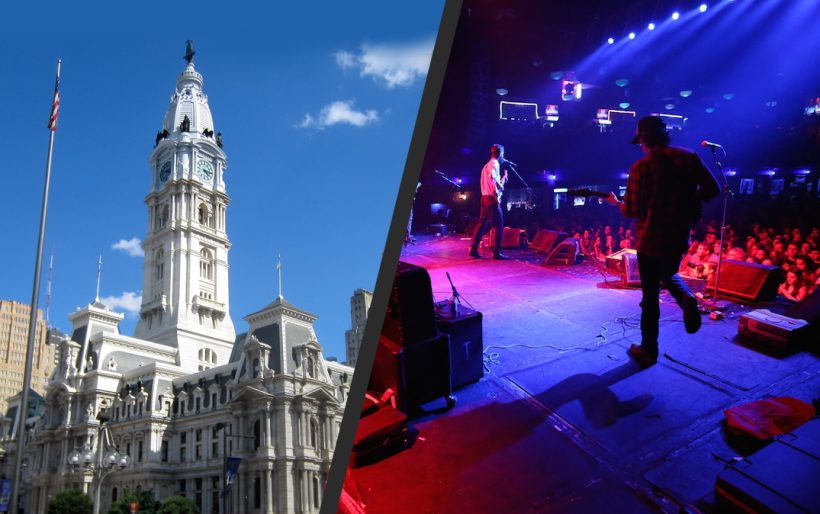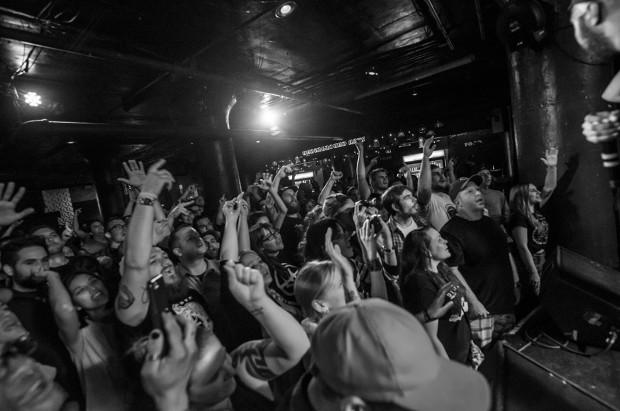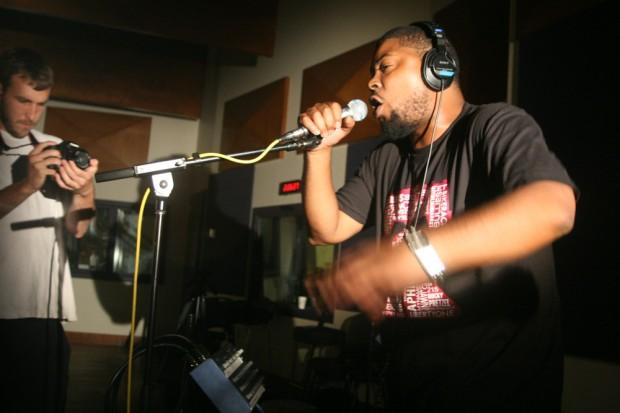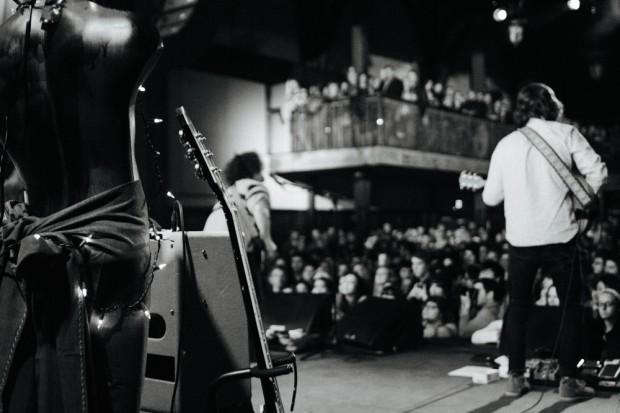
Philadelphia City Hall | photo via Wikimedia Commons (Left), Electric Factory | Photo by John Vettese for WXPN (Right)
“Impractical” and “Insane”: The Philly music community weighs in on City Council’s venue bill
City Council Bill 160016 is, to say the least, problematic.
Last Thursday, Jan. 21, City Council introduced a bill sponsored by 1st District Councilman Mark Squilla that’s generated an outcry from the Philly music community. Rest assured, the legislation has several more steps before it becomes law and it will almost certainly be amended (read: gutted) before it becomes City of Philadelphia law.
Squilla’s bill would amend section 9-703 of Philadelphia Code under “Special Assembly Occupancies,” altering “the application procedures and increasing the fee for a Special Assembly Occupancy license and for Promoter registration, clarifying the role of the Philadelphia Police Department in approvals of licenses…” according to City Council’s bill summary.
Facebook went nuts with a BillyPenn story yesterday, written by Dustin Slaughter, that broke the news. It included a few gems from R5 Productions head honcho, Sean Agnew. Slaughter did his best to break down the unwieldy and, ultimately, misguided language of the 12-page bill: Special Assembly Occupancy licenses would become more expensive ($100 per year to $500 every two years); the Philadelphia Police Department would be involved in the granting of these licenses (read: the police will tell L&I if the venue’s a dump, violent, loud late, etc.); and, perhaps most mystifyingly, venues and promoters could be tasked with collecting the phone numbers and addresses of performers to improve public safety.
Suffice it to say, there’s been an incredible amount of backlash against and press on the bill. The phrase “registry” really has folks riled up – would the City really create a registry of performers and artists gigging regularly or only occasionally? Including giant, national touring artists? The short answer to that is “not really,” and Squilla’s been backpedaling since BillyPenn’s report.
In a Philly.com report today, the Councilman said he the language of the bill “could be easily amended” in regards to the collection of names and addresses. “If that’s a major concern – it has nothing to do with the intent of the bill,” he said, which “was to have all venues that can generate big crowds regulated by the same licenses.”

A crowd at Underground Arts | Photo by Matthew Shaver for WXPN | brightloud.com
Yesterday and today, the Councilman’s Facebook page became a hotbed for disparaging remarks and a space where Squilla could respond directly to constituents. In one post, Squilla wrote “the primary goal of this bill is to close a loophole in the current legislation that has allowed venues to operate without a special assembly license (SAOL). SAOLs are required for certain venues that have live musical and other entertainment. We learned that some operators were able to avoid obtaining an SAOL because there was no live music or a DJ but music was streaming or playing from an iPod or iPad,” he wrote. Why this is suddenly a legislation-worthy issue is at the top of the list of questions lots of promoters and artists are compiling.
“The bill now contains a provision that venues should obtain performers’ contact information to share with city officials should the need arise, but there is no City approval required for any events, nor is a registry of performers being created,” the South Philly native went on in his response to a concerned citizen. “This provision is NOT intended to restrict artistic expression or any kind of entertainment but rather is aimed at addressing public safety and quality of life issues.”
SHOULD THE NEED ARISE is a pretty clear, key phrase here. That need, it is widely rumored, may have presented itself in early September when Lil Durk and Gunplay were headlining the Theater of Living Arts on South Street and 25-year-old John Green was shot and killed outside of the venue.
Larissa Sapko iniated a Change.org petition – it currently has a little under 11,000 e-signatures (the goal is 15,000). “I saw folks starting say things like ‘Oh, let’s go troll the Councilman’s Facebook page,’ which in my opinion is pretty counterproductive,” Sapko told The Key.
It’s a good point. Squilla and his team have been reportedly been deleting Facebook feedback and, naturally, a few off-color threats. But Sapko’s petition exploded as Gawker, Brooklyn Vegan and Impose magazine picked up the story.
“I honestly thought it would only get a few hundred signatures and die out. This got way bigger than I expected it to,” she said. She also offered some insight that has been, in some ways, the elephant in the room – is this NOT targeted towards the hip-hop and African-American community?
“The idea of having to hand my personal information to a venue, who would then hand it over to the police, sounded really Orwellian,” writes the young, white musician. “But after reading more about the bill and having some time to chew on it a little, I think it’s pretty clear that the police aren’t going to be requesting my information anytime soon.
“But I think there are a lot of much more vulnerable people both living in this city and touring through this city who are at a much higher risk of being targeted by police,” she continues. “They’re the ones the bill would really affect.”
To be clear, the Philadelphia Police have stated that they have no intention of either approving specific acts or keeping a list of phone numbers. Commissioner Richard Ross’s legal advisor, Cpt. Francis Healy, says the “department was only interested in getting advance notice so police can be properly prepared for shows or other events.”

Reef the Lost Cauze | Photo by John Vettese
Wait, what’s wrong with looking at venue websites? Don’t they do that already? Doesn’t the Sports Complex Special Services District communicate to the police about Justin Bieber’s visit to Wells Fargo May 7th and 8th?
Local emcee extraordinaire Sharif Lacey, AKA Reef the Lost Cauze, didn’t mince words when asked for comment. “This is typical Philadelphia philosophy – two steps forward, two steps back. We have all these beautiful brand new music venues, and are finally being recognized as a great city to play and enjoy and here they come with the bullshit. Who does this serve? Who is this for?” he rightfully asks. Then, more to the point, he writes “as a hip-hop artist, I feel this is definitely a direct reflection of a long-standing notion that this music and culture still somehow brings out violence… it’s not gonna work. This is the true embodiment of shooting yourself in the foot.”
Johnny Brenda’s booker and former Pattern is Movement drummer, Chris Ward, was more succinct: “This proposed bill is, on its face, an overreach of power. The last year has seen article upon article talking of how Philly’s music scene has grown and had a positive impact. If this bill is put into law, we’ll see that progress take ten steps back.”
We checked in with Sean Agnew, too, to see what the next steps would be and to figure out his involvement. “Nothing has been changed, deleted or amended yet,” he wrote. “It is encouraging to hear that Councilman Squilla could potentially remove the troubling ‘Artist Registration’ item, where artists’ personal information would be share with police.”
His excellent observation, that he shared with BillyPenn’s Slaughter, is that the idea turning over every member of Arcade Fire’s phone number and address to the police is straight-up absurd. “I’m still having trouble drawing a parallel or understand why there will be additional costs and scrutiny placed on established music venues if the bill is intended to close a loophole for bars playing music with an iPad,” Agnew says. Hear, hear – why is City Council concerning itself with how bars pump music through their sound systems?
Luckily, Agnew says the venue and promoter community is on the case. “20+ venue operators and owners are planning to meet on Tuesday to discuss our concerns,” he wrote. “We’ll take those concerns to a meeting with Councilman Squilla next Thursday. He has been in touch through this whole process since Tuesday and has expressed interest in working with the venue owners to create a fair bill.”
A couple things seem obvious: as it’s currently written, this bill has enraged a lot of creatives in the community; and IF and when it passes, it will look nothing like it does now.
Speaking to the language that Squilla used in the BillyPenn piece – indicating that there wasn’t a lot of voiced concerns from the entertainment community – WXPN’s DJ Robert Drake was puzzled. “My biggest concern is the Councilman’s comment that he’s had no pushback from the entertainment community,” said Drake. “Now’s the time for all folks that work in the nightlife industry to stop, focus, and get a better understanding of just what the Councilman is proposing and how it will affect their daily business activity.”
Dynamic and constant Philly promoter Yusuf Muhammad is shaking his head over all this. He just held an event that encouraged newbie promoters to create programming – now he’s not so sure those young, eager enthusiasts will motivate. “I just held a workshop that was to inspire other young creatives in whatever their medium that they’re creating in to become curators, to start doing events, and to start taking things they love and start making them into experiences for others,” he told The Key. In short, Muhammad says, “this is insane.”
DJ Apt One AKA Michael the Lion AKA Michael Fichman has been DJing in Philly and all over the world for years now. He’s equally mystified. “[Squilla’s] district has benefited more than any other in Philadelphia from the influx of arts and entertainment dollars and young people – and he’s proposing to cut off his nose to spite his face,” said Fichman. “There are myriad problems with this bill. It’s impractical. I’ve played all over the country and world and I’ve never been instructed to provide my info to the police.”
Fichman echoes what a lot of folks are saying, which is that there are way bigger fish to fry in Philadelphia. Schools, gun violence, poverty, affordable housing, etc. He’s also keenly aware that race is codified into the bill with tacit language. “As a DJ, whenever management or a promoter instructs not to play hip-hop, it’s certainly coded language for something else,” he observed and concluded that this bill is “foolish on a number of levels and it’s frankly embarrassing.”

The Districts onstage at Union Transfer | Photo by Jeremy Zimmerman | Jeremy-Zim.com
The Districts and Pine Barons’ manager, Marley McNamara, was “almost speechless reading the BillyPenn article… this is hands-down one of the worst proposals and biggest setbacks to the progress that’s been made within the music community here in Philadelphia.” She railed against the handing over of contact info as an infringement of civil liberties. It’s no surprise that the Pennsylvania ACLU has been quoted in multiple stories about the bill deriding its invasion of privacy.
“Why isn’t having the promoter and management’s contact info enough already?” she asks. “Let’s be honest, this came about because of a shooting that happened outside the TLA during a hip-hop concert…this is discrimination to the fullest extent and it’s obvious.”
In another update, PPD’s legal man Healy, expounded on the issue for Philly.com today – he says they never wanted to approve licensing of venues or musical acts. “Don’t think the [PPD] wants anything to do with approving acts. We don’t want to be involved in this. People have First Amendment rights,” he told Aubrey Whelan, adding that there were “mistakes” in the bill’s language.
Venues are already required to report show schedules and crowd estimates two weeks in advance to the police. But the rub is in this part, the mention of “nuisance bars.” “We’ve had some previous experience with fly-by-night individuals who can be the responsible party. Those individuals operate with impunity and no one knows who they are, and then often times the city is left to clean up the mess.” Naturally, Healy says this has “nothing to do with race… something that the Councilman will address if it’s being perceived that way.”
To take a note from McNamara, she is one of many who are expressing a similar sentiment: “I will do my part in the community to stand as a united front with everyone else to make sure this does NOT get passed. It can’t. It absolutely can’t and we won’t let it.”